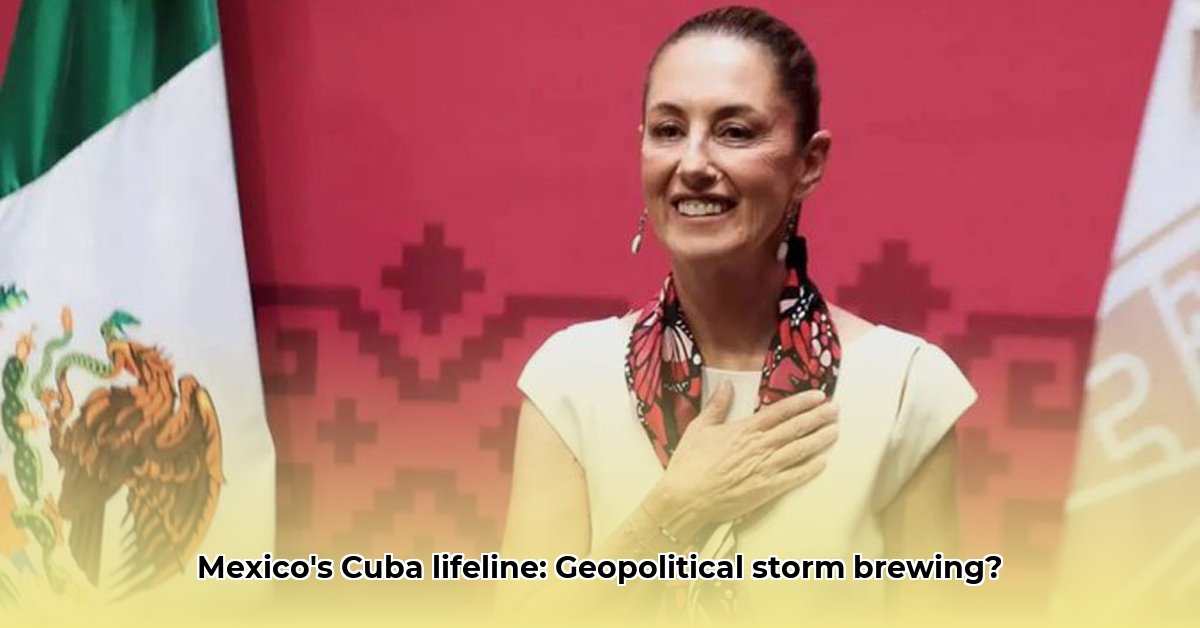Mexico’s recent fuel shipments to Cuba, amidst an escalating energy crisis and tightening U.S. sanctions, represent a complex interplay of humanitarian aid, economic strategy, and geopolitical maneuvering. This deep dive explores the multifaceted dimensions of this evolving relationship, examining its historical context, the motivations behind the aid, and its potential ramifications for regional stability and U.S.-Mexico relations. For a broader geopolitical view, check out this 2025 World Map.
A Historical Tapestry of Solidarity and Pragmatism
The Mexico-Cuba relationship is rooted in a shared history of anti-colonial struggles and revolutionary fervor. Mexico provided crucial support to Cuban revolutionaries, fostering a bond of solidarity that has endured for decades. This historical alliance transcends mere political expediency, reflecting a deep-seated commitment to mutual support, even in the face of international pressure. Mexico’s unwavering diplomatic recognition of Cuba, even during the Cold War when the U.S. imposed its embargo, underscores this unique relationship. This historical context is crucial for understanding the present-day dynamics, highlighting Mexico’s consistent defiance of U.S. policy regarding Cuba.
The Fuel Lifeline: Humanitarian Aid or Strategic Calculation?
The recent fuel shipments from Mexico’s state-owned oil company, Pemex, arrive at a critical juncture for Cuba. Crippled by aging infrastructure, exacerbated by the U.S. embargo, Cuba’s energy grid has faltered, plunging the island into darkness and disrupting essential services. Mexico’s aid provides a much-needed lifeline, alleviating immediate suffering and demonstrating a commitment to its long-time ally. However, the financial details surrounding these shipments remain opaque. While framed as humanitarian assistance, questions linger about the economic arrangements and the long-term sustainability of such aid. Is Mexico extending a helping hand solely out of altruism, or are there underlying strategic and economic considerations at play? The ambiguity itself speaks volumes about the intricate web of motivations driving this energy alliance.
Geopolitical Implications: Navigating the U.S. Shadow
Mexico’s actions unfold within a complex geopolitical landscape, dominated by the long shadow of U.S. policy towards Cuba. The fuel shipments, while not directly violating U.S. sanctions, represent a bold act of defiance, potentially straining relations with its powerful northern neighbor. The U.S. has historically viewed any support for Cuba as a challenge to its authority, and these shipments could be interpreted as undermining its efforts to isolate the island nation. Mexico, therefore, walks a tightrope, balancing its commitment to Cuba with the need to maintain stable relations with the U.S. This delicate balancing act requires deft diplomacy and a calculated assessment of potential risks and rewards.
Pemex’s Financial Burden: A Calculated Risk?
Pemex, already burdened by substantial debt, faces further financial strain from the fuel shipments to Cuba. This raises concerns about the long-term economic implications for Mexico and the sustainability of this aid. Is Mexico jeopardizing its own economic stability by extending this lifeline to Cuba? The lack of transparency surrounding the financial arrangements fuels speculation about the true cost of this assistance and the potential risks for Pemex’s future. This financial dimension adds another layer of complexity to the Mexico-Cuba energy alliance, raising questions about the long-term viability of this partnership.
Regional Dynamics and Shifting Alliances: A Ripple Effect
The fuel shipments extend beyond the bilateral relationship between Mexico and Cuba, creating ripples across the region. They have the potential to reshape energy dynamics and influence political alliances, emboldening other nations to challenge U.S. sanctions or forge closer ties with Cuba. This could lead to a realignment of regional power dynamics, potentially diminishing U.S. influence and fostering greater cooperation among Latin American nations. The long-term consequences of these shifting alliances remain uncertain, but Mexico’s actions could serve as a catalyst for greater regional autonomy and a recalibration of relationships with the U.S.
The Uncharted Future: Uncertainty and Opportunity
The future trajectory of the Mexico-Cuba energy alliance remains uncertain. Several factors will shape its evolution, including Cuba’s economic recovery, U.S. policy towards Cuba under the current administration, and the broader geopolitical landscape. The fuel shipments represent a pivotal moment in this relationship, but their long-term impact is yet to be fully understood. Will this alliance strengthen ties between the two nations, or will it become a source of tension with the U.S.? The answers to these questions will shape not only the future of Mexico-Cuba relations but also the broader dynamics of the region.
- Discover Long Black Pepper: Flavor & Health Benefits - April 25, 2025
- Shocking Twists: The Grownup Review: Unreliable Narration - April 25, 2025
- A Quiet Place Book vs Movie: A Deep Dive - April 25, 2025
















